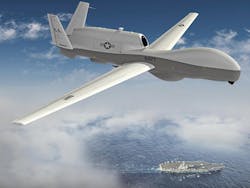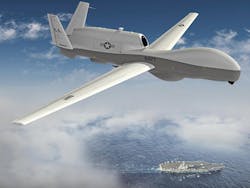Raytheon to provide multispectral sensor for Navy Triton maritime surveillance UAV
CRANE, Ind. - U.S. Navy maritime surveillance experts are ordering three multispectral targeting sensors for new models of the Northrop-Grumman MQ-4C Triton long-range unmanned aerial vehicle (UAV) for maritime patrol applications.
The U.S. Navy MQ-4C Triton unmanned long-range maritime patrol aircraft will be equipped with multispectral sensors.
Officials of the Naval Surface Warfare Center Crane Division in Crane, Ind., announced a $7.2 million contract to Raytheon Space and Airborne Systems in McKinney, Texas, for three AN/DAS-3 Multispectral Targeting System (MTS) sensors for low-rate initial production versions of the Triton maritime surveillance UAV.
The Raytheon MST provides intelligence, surveillance, and reconnaissance (ISR), detection, identification, and targeting capability in day and nighttime operations on manned and unmanned aircraft. MTS sensors provide detailed intelligence data from the visual and infrared spectra. The new AN/DAS-4 MTS variant enables mission commanders to use high-definition data from an airborne tactical sensor to identify and engage targets with greater accuracy, officials say.
The DAS-4 includes four high-definition cameras covering five spectral bands; a three-color diode pump laser designator and rangefinder; laser spot search and track capability; automated sensor and laser bore sight alignment; three-mode target tracker; and built-in provisions for future growth. The advanced electro-optical and infrared system provides tracking and laser designation for the Griffin and Paveway missiles, as well as all tri-service and NATO laser-guided munitions. MTS sensors offer several fields of view, electronic zoom, and multimode video tracking.
L-3 Technologies Advanced Laser Systems Technology (ALST) in Orlando, Fla., is providing the eye-safe laser rangefinders for the Raytheon MTS. This contract also asks Raytheon to provide one electronic unit or early models of the Triton maritime surveillance UAV. Raytheon will do the work in McKinney, Texas, and should be finished by January 2020.
For more information visit Raytheon at www.raytheon.com.

